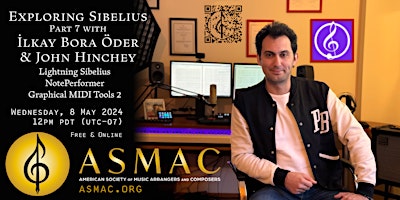Featuring: Larry Blank, Conrad Pope, Michael Feinstein, John Wilson and Jack Campey, along with excerpts from pre-recorded interview with John Williams and Conrad Pope
Written by Millie T. Martin.
The American Society of Music Arrangers and Composers’ webinar on 25 April 2020 paid tribute to an icon of arranging, orchestration and composition, Mr. Conrad Salinger.
Where to begin! Between the years 1931 and 1962 Mr. Salinger orchestrated for film the music of Cole Porter, Irving Berlin, George Gershwin, and Rodgers and Hart. His legacy includes nine Broadway shows and over 75 motion pictures in Hollywood. As a conductor, composer, and orchestrator, his works include Brigadoon, Meet Me in St. Louis, Singing in the Rain, On the Town, Seven Brides for Seven Brothers, An American in Paris, Gigi…and so many, many more. He first met his future musical director at MGM, Johnny Green, while he was an apprentice in NYC. During the golden age of musicals, he was the top principal orchestrator of musicals for MGM pictures. In addition he took on music projects for jazz greats and an innovative dance film with Gene Kelly. Barbra Streisand is adamant about using his orchestrations when they can be located. Conrad Salinger is cited as one of the greatest film orchestrators in the business. He passed in 1962, one year after the largest fire in LA, the Bel Air fire, which destroyed his home.
Interspersed in the webinar were pre-recorded selections from John Williams’s interview, (the full interview will be available at a later date). In 1957 a young John Williams was the pianist for the film Funny Face. He speaks of the magic of rehearsing with Fred Astaire and Audrey Hepburn under the direction of Mr. Salinger. Conrad Salinger understood how to work with his orchestra, collaboraborating with string players to get bowings to match the lyrics and how his score writing fitted so well to the lyrics and dance movements on stage. Mr. Williams pointed out this is becoming a lost art for our young people as modern scoring and use of full-sized orchestras has changed dramatically.
A high point of the webinar for me was being able to hear old recordings and see some of the few remaining examples of his orchestrations. My first thought was this looks like Strauss, with unison triplet passages rising up. Everyone agreed on Strauss, saying how old Hollywood possessed a sound of Der Rosencavelier with romantic emotions painting the musical pictures for film and dance. Mr. Salinger’s orchestrations sounded thick and lush due to the writing of unison parts over sustained lines. His writing and composition style did not require as large an orchestra as his other contemporaries in Hollywood. In an era before hi-fidelity recording his skillful orchestrations contributed to the clarity and lack of distortion in his films as compared to other movie soundtracks of the day.
The unavailability of his scores led to discussion of the devastating fire at the MGM vault in Culver City during 1965. This was an electrical fire which ignited the old nitrate films causing an huge explosion, resulting in the loss of the majority of Mr. Salinger’s scores and arrangements, as well as the entire early sound and silent movie archives. MGM’s vault collection was one of the largest, second only to the Library of Congress, and contained many old rare books and manuscripts about film. This reminds me of the loss of the Mouseion, which was dedicated to the Muses, the nine goddesses of the arts, of which the Great Library of Alexandria was a part…so tragic and final is the death of this history to fire. I found myself glad Mr. Salinger had already passed and did not know of the heartbreaking destruction of his life’s work and manuscripts.
The world’s artistic view was valued and cherished during the early part of the 20th century in the United States. Mr. Salinger studied classical composition at the Paris Conservatory. Gershwin also went to Paris to study with Ravel. It was a time when musicians were going back to Europe to study and America was blessed with huge waves of European immigrants which included great artists, scientists, and musicians. These musicians coming to the United States were not only performers but composers and teachers. Conrad Salinger made it very clear how much he valued all the musicians from other countries and the influence of sound they brought to us all as they played in our American symphonies, on stage and for film. He said these musicians could play anything and any style of music required of them, making his orchestrations live. Such great musicians spread the sound of European orchestras and raised the level of playing for all of the musicians and educators here at home. Supposedly Mr. Salinger also took lessons with Joseph Schillinger, the Russian teacher, composer, and theorist who was known for his system of mathematical musical compositions. The Schillinger method of composition eventually led to the founding of the Berklee College of Music.
Mr. Williams spoke in depth about how Mr. Salinger felt about the musicians and how he said we were lucky to have many of them as part of the wave of people arriving to the United States after the war. All of the presenters agreed and conversation turned to the LA sound and of the musicians who made it. The fact you needed great french horn players to perform the Strauss-like sound and style in Mr. Salinger’s orchestrations. The NY Philharmonic, LA Philharmonic, MGM Players, and other orchestras in the film industry of Hollywood were loaded with these gifted musicians. Mention was made that the French horn sound was attributed to Mr. Alfred Brain Jr., part of the world famous family of French horn players. He too immigrated to the US, performing with the NY Philharmonic before coming out to Hollywood to play with the LA Philharmonic. He was a musical presence in the recording studios and also a great teacher. Without these immigrants the US would not have had the breadth of cultural benefit from the likes of Prokofiev, Rachmaninov, Schillinger, and so many others.
Mention was made by several of the presenters of having seen rosters of the incredible musicians for the old productions of the great films and musicals. In the credits, the musicians were recognized as vital and important partners of the art form along with the composer, orchestrator, and arranger. Today’s movies list all the hairdressers and even thanks the pizza delivery person in the credits, but no mention is made of the orchestral players. As a musician I find this heartbreaking. Our union needs to make sure the players of our generation get the recognition they deserve as part of our recording contracts. I have no doubt Mr. Salinger would agree.
One cannot think of growing up without the sounds of An American in Paris, Singing in the Rain, or Easter Parade. This list is so long and has shaped the dreams of us all as Americans. The presenters’ hearts were all evident in mourning as to the loss of scores and arrangements in the MGM vault explosion and fire. They spoke in depth about how some were being reconstructed bit by bit, but the task is arduous and an act of love. I was moved by all of the interviews regarding Conrad Salinger, hearing how this gifted man appreciated the musicians, touched the listener and molded the following generations of great film composers, orchestrators and arrangers.



